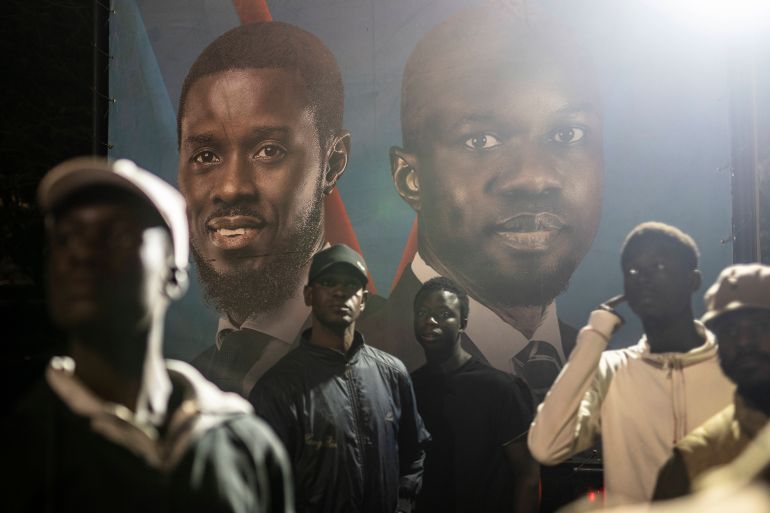What’s next for Senegal under likely President Bassirou Diomaye Faye?
Faye promises to review the West African nation’s mining contracts and ties with key nations. Now, he’ll be tested.

Bassirou Diomaye Faye, a previously little-known tax inspector freed from jail two weeks ago, looks likely to become Senegal’s next president after a vote that observers say is proof of the country’s democratic resilience.
While the electoral commission is expected to announce final results in the coming days, early tallies showed Faye winning an outright majority in Sunday’s election. His main rival, ruling party candidate Amadou Ba, conceded defeat late on Monday. And outgoing President Macky Sall congratulated the 44-year-old on the results. “This is the victory of Senegalese democracy,” Sall said.
The election, originally scheduled for February, was delayed by Sall, sparking speculation that he was contemplating extending his rule — he has completed two terms and is barred from a third under the constitution — before he eventually agreed to the vote on Sunday.
Senegal has a history of peaceful transitions of power since its independence in the 1960s, Hawa Ba, associate director of the Open Society Foundation, said on Monday. “But yesterday was more important as people wanted to turn a page of Senegal’s political history.”
Now Faye has a nation’s expectations to deliver on.
Faye was not the face of the opposition in the election. Ousmane Sonko was. Sonko, also a tax inspector, won widespread popularity among Senegalese youth by promising to tackle corruption – perceived as a distinct trait of Sall’s government. He charmed those who felt left out of the country’s pre-COVID-19 economic boom, a 10-year success story that won the country international praise for becoming one of the fastest-growing economies in Francophone Africa, but the growth failed to translate into better job opportunities for young people. Three out of 10 Senegalese aged 18 to 35 are jobless, according to Afrobarometer data.
Sonko was jailed and barred from running in the elections over defamation charges, but his popularity did not wane. Instead, he urged his supporters to vote for Faye, the man he nominated as his heir.
Faye’s support came from different sectors of society, ranging from disenchanted youth to middle-class entrepreneurs.
“I pledge to govern with humility and transparency and to fight corruption at all levels,” Faye said late on Monday. “I pledge to devote myself fully to rebuilding our institutions.”
Faye ran his electoral campaign promising to radically change political practices and the country’s economic orientation. Proposals include a review of the country’s mining and energy contracts to give Senegalese more control over their own resources and profits, more independence for the judiciary, reduction of the president’s power and regional monetary reforms.
Sonko and Faye also promised to review ties with former colonial power France in a move that raised questions over the country’s future foreign policy. Anti-French sentiments in other Francophone countries in West Africa – such as Burkina Faso, Mali and Niger – have fomented military coups. France has pulled out militarily from these nations, which have turned instead to Russia.
Vincent Foucher, West Africa analyst at the Bordeaux Institute of Political Studies, believes foreign policy will not change significantly.
“Sonko took a strong position against France but showed afterward that he was willing to compromise – the tone has not been too alarming,” Foucher said.
In March last year, Faye told French media that Senegal was looking for a “win-win partnership”. Back then, he didn’t know he was likely to become the face of it.
Faye’s apparent win and even the vote itself was not guaranteed just a month ago when Sall postponed the election. The move plunged the country into chaos, triggering deadly protests and prompting the country’s highest court to overrule the decision.
Sall’s second mandate was marred by violence and democratic backsliding, which left a bitter taste in the mouths of many Senegalese, observers said. In the past three years, dozens of protesters were killed and 1,000 people were imprisoned on politically motivated charges, according to Human Rights Watch.
Eventually, last weekend, more than seven million voters queued to cast their ballots in peaceful scenes that stood in stark contrast with the drama of the past month.
“This victory shows that Senegal’s democracy has been able to produce all the necessary antibodies to heal and resist,” said Alioune Tine, founder of the Senegal-based think tank Afrikajom Center. “It shows that our democracy is in good shape.”
This is not the first time Senegalese voters have fought back against an attempted constitutional breach. In 2012, two-time President Abdoulaye Wade tried to run for a third term. The move was not welcomed by young people, who voted en masse for Sall, the then-opposition candidate.
-al jazeera




